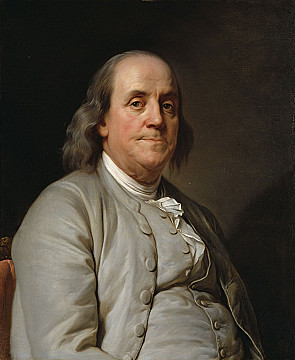Benjamin Franklin (1706-1790)
U.S. Founding Father, Polymath, President of Pennsylvania, Minister to France etc.
He was born on Milk Street in Boston, Massachusetts. For five years from the age of 12 he was apprenticed to his brother in the printing business before running away to Philadelphia where he returned to after a brief, fruitless spell in London. In 1727, age-21, he established the Junto, made up of aspiring artisans and tradesmen intent on improving civil society. This gave rise to the Library Company of Philadelphia (1731) and the concept of the Junto itself was so well-received throughout the colonies that in 1743 it became the American Philosophical Society. In 1736, he established the first fire brigade in Philadelphia, the Union Fire Company, and to ensure that losses could be recuperated he created the Philadelphia Contributionship - the oldest property insurance company in the United States. In 1749, he established the Academy of Philadelphia which incorporated America's first medical school and has since become the University of Pennsylvania. Two years later (1751) he established the city's first hospital, the Pennsylvania Hospital that took an innovative approach to the mentally ill.
In 1754, he was the first person to conceive of the idea of a "United" States, calling for the thirteen colonies to work as one. In 1766, his testimony helped repeal the Stamp Act and in 1775 he became the first U.S. Postmaster-General, creating the modern American postal system. In 1776, he and John Adams spear-headed the Second Continental Congress to proclaim the Declaration of Independence. In 1778, he single-handedly negotiated the Treaty of Alliance with France and in 1783 he was chosen to be part of the American delegation that brokered the Treaty of Paris with England, ending the war and securing American independence. He played was fundamental to creating the new Constitution at the 1787 Convention and was the only Founding Father to sign the U.S. Declaration of Independence, the Treaty of Alliance, the Treaty of Paris, and the Constitution.
Although it quickly failed, he nonetheless published the first German-language newspaper in America in 1732. From the following year, under the pseudonym 'Richard Saunders' he began writing Poor Richard’s Almanack which became one of the most popular of its kind in America. As a scientist, Franklin began investigating the mystery of electricity from 1746 and he was among the first to comprehend its capabilities for which he was the n recognition of his work with electricity, he received the Royal Society's Copley Medal in 1753, and in 1756. He was also a prodigious inventor who conceived of the lightning rod, the Franklin stove, a flexible catheter, and bifocal glasses. A dedicated republican and democrat, and a true polymath in every sense, his further interests and achievements have literally filled books and his name lives on through numerous dedications. In 1730, he married Deborah, daughter of John Read, of Philadelphia. They had two children (one of who died in childhood) and he fathered another son by an unknown mistress.
In 1754, he was the first person to conceive of the idea of a "United" States, calling for the thirteen colonies to work as one. In 1766, his testimony helped repeal the Stamp Act and in 1775 he became the first U.S. Postmaster-General, creating the modern American postal system. In 1776, he and John Adams spear-headed the Second Continental Congress to proclaim the Declaration of Independence. In 1778, he single-handedly negotiated the Treaty of Alliance with France and in 1783 he was chosen to be part of the American delegation that brokered the Treaty of Paris with England, ending the war and securing American independence. He played was fundamental to creating the new Constitution at the 1787 Convention and was the only Founding Father to sign the U.S. Declaration of Independence, the Treaty of Alliance, the Treaty of Paris, and the Constitution.
Although it quickly failed, he nonetheless published the first German-language newspaper in America in 1732. From the following year, under the pseudonym 'Richard Saunders' he began writing Poor Richard’s Almanack which became one of the most popular of its kind in America. As a scientist, Franklin began investigating the mystery of electricity from 1746 and he was among the first to comprehend its capabilities for which he was the n recognition of his work with electricity, he received the Royal Society's Copley Medal in 1753, and in 1756. He was also a prodigious inventor who conceived of the lightning rod, the Franklin stove, a flexible catheter, and bifocal glasses. A dedicated republican and democrat, and a true polymath in every sense, his further interests and achievements have literally filled books and his name lives on through numerous dedications. In 1730, he married Deborah, daughter of John Read, of Philadelphia. They had two children (one of who died in childhood) and he fathered another son by an unknown mistress.












